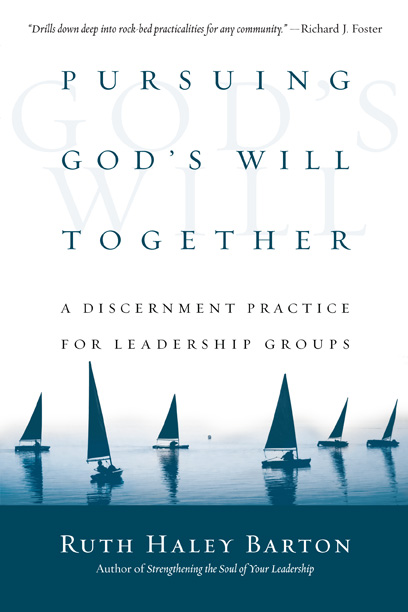
Q&A with Ruth Haley Barton about new book
 How is Pursuing God’s Will Together different from other books on leadership?
How is Pursuing God’s Will Together different from other books on leadership?
Ruth Haley Barton: This book is designed to be a one-stop shop for leadership groups who want to shift their approach to leadership from a model that relies primarily on human decision making and strategic planning to an approach that is defined by the spiritual practice of corporate discernment. It is a book for leaders and leadership groups to read and experience together. Not only does it help leaders reflect on discerning and doing God’s will as the heart of spiritual leadership, it offers them a step-by-step process for becoming a community for discernment at the leadership level along with an actual practice for corporate discernment.
You write that the preparation for becoming a community for discernment is more important than the process. Why is that ?
Ruth: In Romans 12:2 Paul writes that we are to be transformed by the renewing of our minds so that we can discern the will of God, what is good and acceptable and perfect. This seems to indicate that spiritual transformation is a prerequisite to our ability to discern—both personally and corporately. Paul is not primarily addressing individuals here. He is addressing a community of believers gathered in Rome and giving all sorts of instruction about how to be a community that is distinctly Christian. If leaders are on an intentional journey of spiritual transformation alone and together, discernment will begin to happen quite naturally even without a process. Conversely, if they are not involved in an intentional process of transformation, they will not be able to do much discernment, even if they have a process. There are too many human dynamics that get in the way.
What are some of the obstacles to discernment at the leadership level?
Ruth: Chapter one of Pursuing God’s Will Together is an extended reflection on John 9 in which many individuals and groups of people—all very religious—saw the same man healed by Jesus but for all sorts of different reasons were not able to discern the work of God in their midst. The “obstacles to seeing” that were at work in this story are the same obstacles we experience today. Like the disciples, we might be asking the wrong questions—questions about theology and blame rather than questions about what God is doing and how we can get on board with it. Like the neighbors, we might be so caught up in our paradigm regarding the way things have always been that we can’t recognize anything new that God might be doing. We might be like the Pharisees who were so committed to preserving the religious system they were a part of— that they expelled any person who had any experience that threatened it. Or we might be like the parents, who recognized that God was doing something new but were afraid to say so.
How does Pursuing God’s Will Together fit with the mission of the Transforming Center?
Ruth: Our goal is to strengthen the souls of clergy and Christian leaders, equipping them to guide their churches and organizations in becoming transforming communities that discern and do the will of God. This book is one expression of our commitment to equipping leaders and leadership groups to do that very thing. Over the last ten years we have consistently worked according to a clear strategy—focusing on the spiritual transformation of individual leaders (through our Transforming Community® experience) which, of course, results in an increasing capacity to be discerning. The next step is to help them integrate what they are learning personally into their leadership settings so that they can cultivate whole communities of spiritual transformation that are able to discern and do the will of God together. In September we will be starting a new program called Leading a Transforming Church. In addition to teaching, content, and group process this new program will serve as a launching pad for the Transforming Church™ network, an affiliation of clergy and ministry leaders committed to leading communities of spiritual transformation that discern and do the will of God.
What are your hopes for Pursuing God’s Will Together?
Ruth: My prayer is that this book will cast vision for discernment as the heart of spiritual leadership in a church/Christian ministry culture that has relied quite heavily on secular leadership models over the last number of years. Closely related is my hope that many leaders will be moved to drive a stake in the ground and commit themselves to discerning and doing God’s will as the focus of their leadership. In fact, we are convening a group of clergy and senior leaders of Christian ministry organizations to grapple with the implications and practical outworkings of this commitment. My final hope and prayer is that entire leadership groups will engage the book together and take the step-by-step journey of becoming communities that discern and do the will of God.
View the table of contents and read endorsements by visiting pursuinggodswilltogether.com
• Pre-order from Amazon by clicking here.
• Preorder for your Kindle by clicking here.
• Read an expert from the introduction: Discernment: The Heart of Spiritual Leadership
©Ruth Haley Barton, 2012. Ruth Haley Barton (Doctor of Divinity, Northern Baptist Seminary) is founder of the Transforming Center. A teacher, spiritual director and retreat leader, she is the author of numerous books and resources on the spiritual life including Pursuing God’s Will Together, Strengthening the Soul of Your Leadership, Sacred Rhythms, and Invitation to Solitude and Silence.
Do you have a question about Ruth’s new book? Write your question below and she will do her best to answer.
Leave a comment below.
The purpose of the Beyond Words blog is to offer helpful and hopeful content and conversation that strengthens the souls of leaders and the congregations and communities they serve. All comments are monitored and the TC reserves the right to delete those that are not consistent with this goal and purpose. Access our comments policy.
Join thousands of pastors and spiritual leaders
Receive Beyond Words®, reflections on the soul of leadership. Written by Ruth Haley Barton, each reflection provides spiritual guidance and encouragement for those seeking to be in God for the world.

Firstly you say ‘Like the disciples, we might be asking the wrong questions—questions about theology and blame rather than questions about what God is doing and how we can get on board with it.’ But theology must be correct and is the basis of our faith, rather than a subjective nebulous ‘what God is doing’. We are saved by doctrine i.e. faith in Christ!
Secondly, you say ‘… the Pharisees who were so committed to preserving the religious system they were a part of— that they expelled any person who had any experience that threatened it.’ This is not true: the Pharisees promoted tradition, not true Jewish religion. They opposed Jesus because He fulfilled their actual ‘religious system’.
Andrew
Is there a question in there? If so, I would be happy to respond…
For years you have been careful to say that personal transformation is not a quick fix. That it takes time to grow into with spiritual practices. How do you see leadership groups grappling with the issue of moving too fast in this area of discernment? Will there be a temptation for those groups to hurry into a discernment method?
Great question, David! I think there will be a grave temptation for leadership groups to skip the “pre-work” of personal transformation and discernment in the life of each leader and culitvating community at the leadership level so they can get to the practice of discernment quicker. I am also concerned that leadership groups will want to baptize their current methods of decision making and strategic planning with the language of discernment rather than embarking on the more arduous and challenging journey of becoming a community for discernment and grappling with the demands of a true discernment process. As human beings, our capacity for self-deception in this arena is unbounded–calling our decision making processes discernment when all we are really doing is our own will and following the compulsions of the ego thinly veiled with spiritual-sounding language. The ONLY way to prevent this is for leaders to engage in a rigorous and intentional journey of transformation that enables them to tell the difference between what is true and what is false within them as a necessary pre-requisite to discernment.
Did I miss it? When will the book be out for the general public? I can’t wait to read it and give it to pastors of our supporting churches. Is there a way of gettin multiple copies at a reduced rate?
You didn’t miss it. It is expected to be available in book stores in June, but we expect to have it at the Transforming Center by the end of this month. If you are on our eReflections mailing list you will be the first to know. I believe the best rate you will receive is right now from Amazon. There preorder price will be hard to beat.